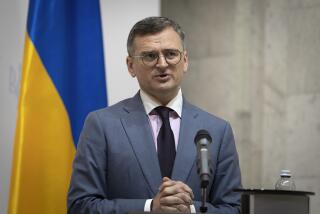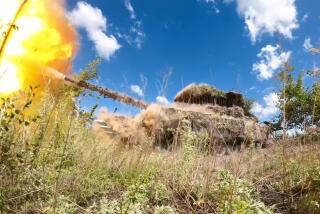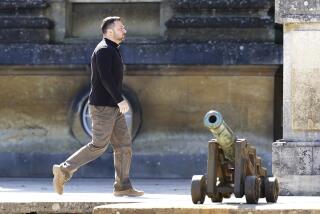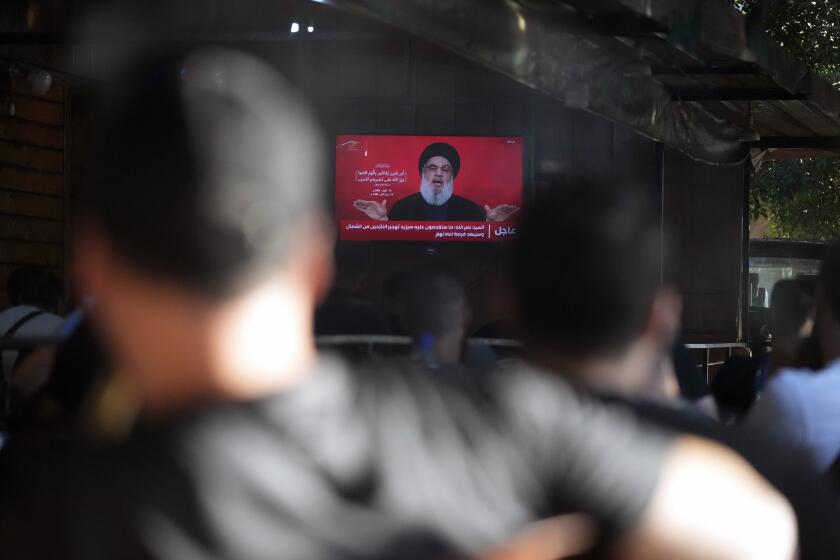Ukrainian exit polls indicate chocolate magnate won presidential vote
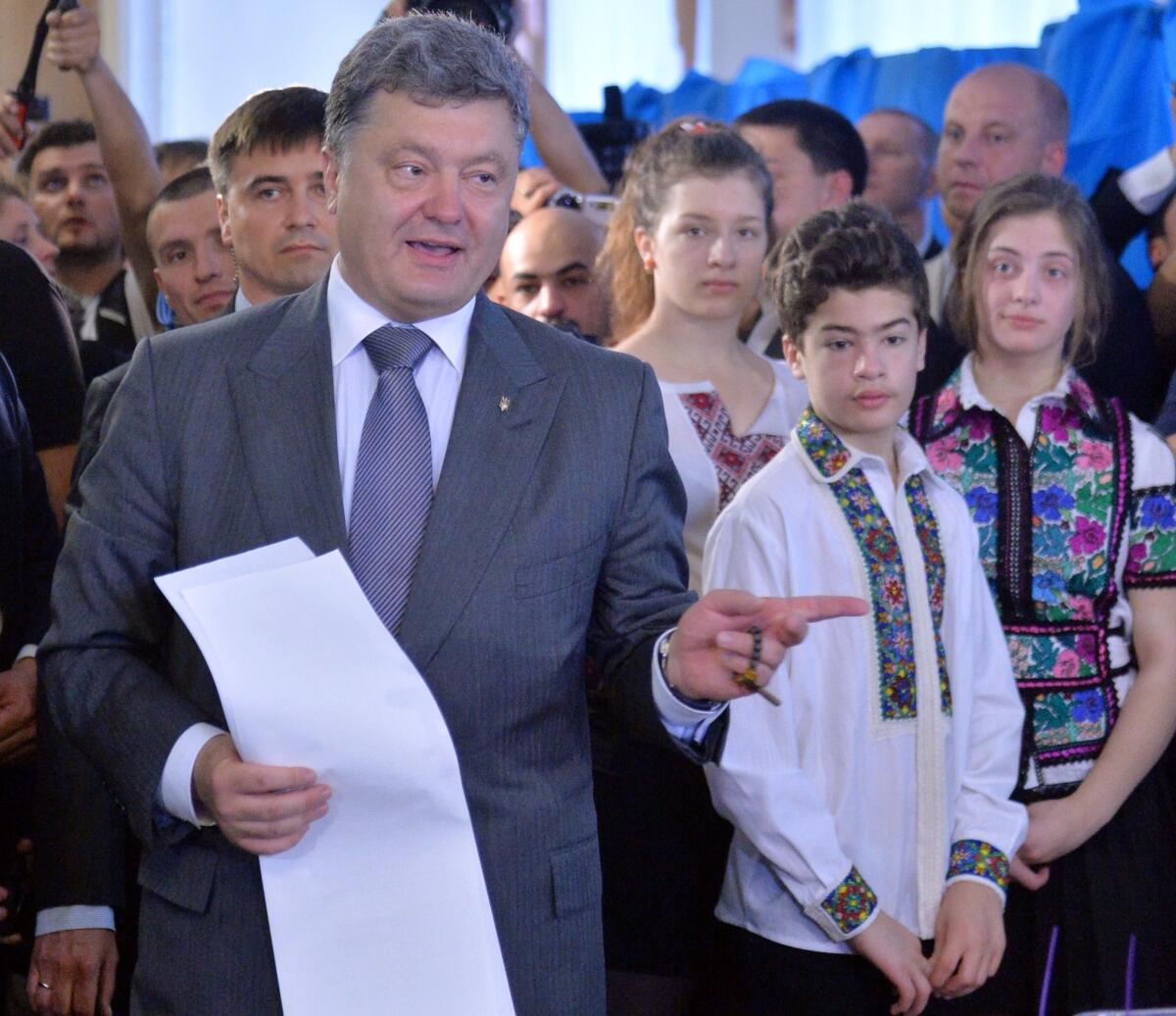
Ukrainians braved armed separatists in the east and epic storms in the capital, Kiev, on Sunday to cast ballots for a new president to restore legitimate leadership in their country three months after a rebellion toppled the last head of state.
An exit poll released as soon as polls closed at 8 p.m. local time showed confectionary magnate Petro Poroshenko with nearly 56% of the vote, based on 17,000 interviews with voters conducted by the Razumkov Center public opinion research firm.
Former Prime Minister Yulia Tymoshenko was shown running a distant second with less than 13%, but with widespread disruptions of voting in eastern Ukraine it was unclear if the exit poll was a reliable indicator of the national vote.
If Poroshenko does clear the 50% mark when votes are tabulated, probably Monday, he will win outright and avoid a June 15 runoff, which many feared would subject Ukraine to three more weeks of uncertainty and divisive violence.
Pro-Russia gunmen who occupy two industrial regions along the eastern border with Russia thwarted voting in most of the territory around Donetsk and Luhansk, having threatened election workers and seized ballot boxes delivered to the areas beset by armed conflict for the past two months.
Election organizers conceded a day before Sunday’s vote that they had been unable to open polling places in about two-thirds of the two eastern regions’ voting districts, meaning that about 10% of Ukraine’s population had no opportunity to participate. Oleksandr Chernenko, head of the Ukrainian Voters Committee, said there was too little time to arrange alternative voting venues or mail-in ballots.
Darya Levchuk, a contributing journalist to Hromadske, a social media site that broadcasts on television, reported from Luhansk that turnout was expected to be no more than 10% of the region’s eligible voters.
The network also carried video from Mariupol, a city on the Sea of Azov that has been controlled on and off by militants for the past month. The film showed defiant voters casting ballots as a tentative police watch appeared to deter overt intimidation by the gunmen who have proclaimed the city part of an independent republic.
Oleksandr Boroday, named prime minister of the separatist “People’s Republic of Donetsk” two weeks ago, was filmed outside the barricaded regional government headquarters boasting of having prevented any voting in the city of Donetsk.
“As you know, this territory is no longer part of Ukraine,” said the militants’ leader, followed by an armed security entourage.
The combined populations of the Luhansk and Donetsk regions account for about 15% of the 44 million Ukrainians remaining after Russia annexed Crimea and its two million citizens in March.
Results of the vote weren’t expected until Monday as most of the ballots were filled out by hand and were too long, with local mayoral races in some areas, to be counted electronically.
In Kiev, hopeful citizens turned up at the polls in droves in the early hours of voting, before the warm sunny day escalated into a steam bath, followed by torrential rain, hail, thunder and lightning.
“We hope that with this vote all people in the country will see that we have a proper leadership in place and that we can have peace again. We never in our lives expected to see what has been happening in Ukraine these last weeks,” said Natalya Khokhlova, an engineer and youthful-looking grandmother juggling 7-month-old Yevangelina on her hip as daughter Yevgenia cast her ballot at an elementary school in central Kiev.
Khokhlova and her husband, Ihor, declined to say for whom they had voted, but expressed their desire to see Ukraine align with the European Union and make peace with the Russian-speaking separatists in the east.
Although more than half of the 21 candidates in the presidential race have run on a pro-Europe platform, Poroshenko, the billionaire “Chocolate King,” emerged as the clear front-runner in the race, advocating a geopolitical balance between Brussels and Moscow and denouncing the resort to violence that has plagued the country since the last president, Viktor Yanukovich, was ousted in February.
“I am convinced that this election must finally bring peace to Ukraine, stop lawlessness, stop chaos, stop bandit terror in the east,” Poroshenko told journalists after casting his ballot in central Kiev, vowing to see to swift disarmament of all illegal militias in the country.
Heading into the election, ,Poroshenko had support from about 45% of voters, according to a poll conducted in mid-May by the Razumkov Center. His closest rival, Tymoshenko, drew 8% in the poll of 2,011 people. It had a margin of error of plus or minus 2.3 percentage points.
Tymoshenko, who spent more than two years imprisoned during Yanukovich’s regime for alleged corruption, dispensed with her signature braided crown when she cast her ballot on Sunday, sporting a more mature look with a bun and headband.
“It is time to hold a referendum on joining NATO to restore peace in Ukraine,” Tymoshenko said after voting in her east-central home city of Dniepropetrovsk.
Fear of Ukraine slipping into the orbit of NATO, the rival military alliance of the former Soviet Union, has been an instigation for the pro-Russia militants and their suspected Kremlin backers. They see Ukraine’s political, economic and security overtures to the West as a threat to Russia’s traditional influence in the region.
Poroshenko has said that NATO membership shouldn’t be a first order of business for Ukraine as it provokes deeper division in a country already severed into Moscow-oriented eastern industrial areas and western and central regions seeking a place in the community of Europe.
Some who came to vote on Sunday said they were choosing according to the wishes of the country’s young people, who formed the backbone of the three-month rebellion against Yanukovich after he unilaterally abandoned an economic and political association agreement with the European Union in November.
Retired teacher Nila Chekerda said her four grown children had urged her to vote for Poroshenko.
“Everything must get better. It’s so terrifying what is happening now, people being killed by people who are their neighbors. What a nightmare!” the 80-year-old said with a shudder.
Asked if she trusted Russian President Vladimir Putin’s recent assurances that he would work with whoever is elected to lead Ukraine, Chekerda angrily replied: “Hardly!”
“We can’t expect anything from him. He’s just like Yanukovich, carving up Ukraine for his own political benefit,” she said. “I was born in Russia and never would have believed in my lifetime that we could be living through such a terrifying situation.”
Fighting appeared to have died down on election day, but news agencies in the rebel-held cities described menacing patrols of masked gunmen visiting the closed polling places in Donetsk and Luhansk to ensure that no one dared show up to cast a ballot. The Associated Press said one group of militants who had seized a ballot box from a Donetsk suburb made a show of smashing it in front of western journalists’ cameras.
Word also reached Kiev of the deaths of two foreign journalists near the embattled town of Slovyansk, in Donetsk region. Italian photographer Andrea Rocchelli and his Russian interpreter and assistant, Andrey Mironov, were hit by mortar fire on Saturday during a battle between the pro-Russia gunmen and Ukrainian army troops manning checkpoints outside the town that has been at the center of the deadly clashes.
“These deaths are horrid reminders that not enough is being done to protect journalists who risk their lives reporting from conflict zones in Ukraine,” said Dunja Mijatovic, the media rights advocate for the Organization for Security and Cooperation in Europe, which also has hundreds of election observers deployed in the country this weekend.
More to Read
Sign up for Essential California
The most important California stories and recommendations in your inbox every morning.
You may occasionally receive promotional content from the Los Angeles Times.
